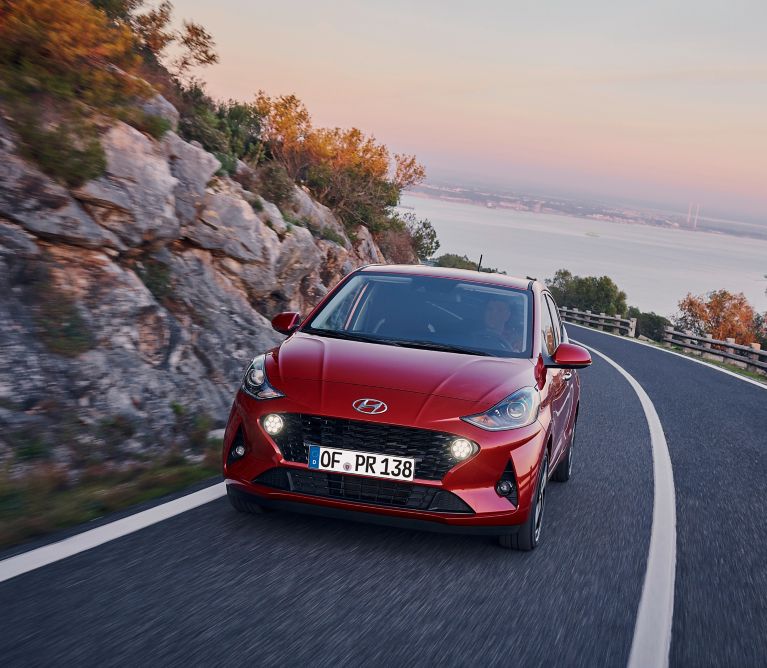- The Hyundai i10 has won the “Value Champion” award in the A-segment for the second time
- The award recognises the i10 as one of the cars with the most stable values in the German market
- The i10’s high residual value offers motorists financing and leasing benefits
Press material
-
Download
-
Images
The Hyundai i10 has received a prestigious award from the renowned German magazine Auto Bild and the independent market observer Schwacke GmbH for the second time in a row. They have named the Hyundai i10 the “Value Champion 2021” among small city cars.
Experts have forecasted that the i10’s residual value after four years and 11,000 kilometres per year will remain at 56.86 per cent. Boasting this high residual value, the Hyundai i10 is one of the vehicles with the most consistent values on the German market. The model had already received this award in 2020 and has, once again, prevailed over established competitors.
The fact that the i10 has received this award for the second time in a row proves that our commitment to the small car segment is the right decision. With its low depreciation, sporty and attractive design, and state-of-the-art safety and connectivity features, the Hyundai i10 is exactly what our customers want. I believe that the i10 will also open doors to the world of Hyundai for new customers.
Judging on numerous criteria
As of 2021, Auto Bild and Schwacke have been giving this award to vehicles with the most constant residual value for the 18th consecutive year. Hundreds of details go into judging the cars. This includes factors such as general economic development, new legal requirements, and customer trends, as well as operating costs, product concept, design, customisation options, and price. Additionally, product quality, the expected number of units to be produced, and manufacturer rebates, as well as upcoming model changes, are also considered.
In times when costs are rising significantly for motorists, our “Value Champion 2021” award provides them with valuable input. A high residual value means a low loss in overall value, so leasing companies and banks reward them with more favourable financing rates.
The Hyundai i10 and other vehicles with a low depreciation stay in high demand with age and fetch higher prices on the used car market. In the case of a Hyundai model, the unique five-year manufacturer’s warranty with unlimited mileage also adds to this. Every new Hyundai car comes with Hyundai’s comprehensive warranty package without charge when purchased from an authorised Hyundai dealer in the European Economic Area or Switzerland.
The Hyundai i10 comes equipped with safety package
The Hyundai i10 not only sets the standard among the A-segment in terms of residual value, but the model also offers many new features that, until now, have only been available in higher vehicle segments. Even the entry-level version of the Hyundai i10 comes with the most important safety and driver assistance systems, such as Forward Collision-Avoidance Assist (FCA), Lane Keeping Assist (LKA), Driver Attention Warning (DAW), and High Beam Assist (HBA). In addition, the Hyundai Bluelink® telematics system allows the driver to connect to the in-vehicle infotainment system via an app. Drivers can also take advantage of Hyundai Live Services and the phone mirroring systems, Android Auto™ and Apple CarPlay©, using the eight-inch navigation system.
Disclaimer: CO2 and emissions data
- Fuel consumption combined for the Hyundai i10 1.0 (4 seater eco) with 5MT in l/100 km: 5.4-4.8; CO2 emissions combined in g/km: 122-110 (WLTP)
- Fuel consumption combined for the Hyundai i10 1.0 (4 seater) with 5MT in l/100 km: 5.5-4.9; CO2 emissions combined in g/km: 125-111 (WLTP)
- Fuel consumption combined for the Hyundai i10 1.0 (4 seater) with 5AMT in l/100 km: 5.9‑5.2; CO2 emissions combined in g/km: 134-119 (WLTP)
- Fuel consumption combined for the Hyundai i10 1.0 (5 seater) with 5MT in l/100 km: 5.5-5.0; CO2 emissions combined in g/km: 126-114 (WLTP)
- Fuel consumption combined for the Hyundai i10 1.0 (5 seater) with 5AMT in l/100 km: 5.9‑5.2; CO2 emissions combined in g/km: 134-119 (WLTP)
- Fuel consumption combined for the Hyundai i10 1.2 (4 seater) with 5MT in l/100 km: 5.8‑5.1; CO2 emissions combined in g/km: 132-117 (WLTP)
- Fuel consumption combined for the Hyundai i10 1.2 (4 seater) with 5AMT in l/100 km: 6.1‑5.4; CO2 emissions combined in g/km: 138-122 (WLTP)
- Fuel consumption combined for the Hyundai i10 1.2 (5 seater) with 5MT in l/100 km: 5.8‑5.1; CO2 emissions combined in g/km: 132-117 (WLTP)
- Fuel consumption combined for the Hyundai i10 1.2 (5 seater) with 5AMT in l/100 km: 6.1‑5.4; CO2 emissions combined in g/km: 138-122 (WLTP)
- Fuel consumption combined for the Hyundai i10 1.0 T-GDI in l/100 km: 5.4; CO2 emissions combined in g/km: 123 (WLTP)













